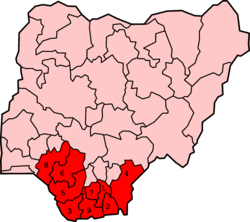
Back الصراع في دلتا النيجر Arabic Conflictu del Delta del Níxer AST Канфлікт у дэльце Нігера Byelorussian Conflicte del delta del Níger Catalan Válka v deltě Nigeru Czech Konflikt im Nigerdelta German Conflicto del Delta del Níger Spanish درگیری در دلتای نیجر Persian Nigerin suiston konflikti Finnish Crise dans le delta du Niger French
The current conflict in the Niger Delta first arose in the early 1990s over tensions between foreign oil corporations and a number of the Niger Delta's minority ethnic groups who feel they are being exploited, particularly the Ogoni and the Ijaw. Ethnic and political unrest continued throughout the 1990s despite the return to democracy[17] and the election of the Obasanjo government in 1999. Struggle for oil wealth and environmental harm over its impacts has fueled violence between ethnic groups, causing the militarization of nearly the entire region by ethnic militia groups, Nigerian military and police forces, notably the Nigerian Mobile Police.[18] The violence has contributed to Nigeria's ongoing energy supply crisis by discouraging foreign investment in new power generation plants in the region.
From 2004 on, violence also hit the oil industry with piracy and kidnappings. In 2009, a presidential amnesty program accompanied with support and training of ex-militants proved to be a success. Thus until 2011, victims of crimes were fearful of seeking justice for crimes committed against them because of a failure to prosecute those responsible for human rights abuses.[19]
- ^ "Amnesty Programme: Niger Delta Revolutionary Crusaders berate those seeking to oust Prof. Dokubo". Vanguard-nigeria. Retrieved 2023-02-03.
- ^ Siarhei Bohdan.Belarusian Military Cooperation With Developing Nations: Dangerous Yet Legal // Belarus Digest, 5 December 2013
- ^ Нигерийские солдаты проходят специальную подготовку в Беларуси для борьбы с боевиками в дельте Нигера Archived 2018-07-16 at the Wayback Machine - Центр специальной подготовки Республики Беларусь {{in lang|ru}
- ^ "VK.com | VK". m.vk.com.
- ^ "Инструкторы из Израиля готовят нигерийский спецназ". Archived from the original on 2018-09-10. Retrieved 2018-09-09.
- ^ Israel sends experts to help hunt for Nigerian schoolgirls kidnapped by Islamists. Archived 2018-09-10 at the Wayback Machine The Jerusalem Post; 05/20/2014 18:03.
- ^ Minahan, James B. (2016). "Urhobo". Encyclopedia of Stateless Nations: Ethnic and National Groups around the World. Santa Barbara, California: Greenwood. p. 442–443. ISBN 978-1-61069-954-9.
- ^ a b c d e Tife Owolabi (14 June 2017). "New militant group threatens Niger Delta oil war - in Latin". Reuters. Archived from the original on 21 July 2018. Retrieved 20 July 2018.
- ^ ‘Asari Dokubo asking Niger Delta to join Biafra is a suicide mission’, PM News, 17 March 2021. Accessed 18 March 2021.
- ^ Ludovica Iaccino. "Pro-Biafrans claim Niger Delta Avengers link: Who is behind group that halted Nigeria's oil production?". IBTimes. Archived from the original on 13 September 2016. Retrieved 7 September 2016.
- ^ Cite error: The named reference
taz03092021was invoked but never defined (see the help page). - ^ "Nigeria's Cults and their Role in the Niger Delta Insurgency" by Bestman Wellington, The Jamestown Foundation, 6 July 2007
- ^ "BBC News - Nigerian militants seize workers from oil rig". bbc.co.uk. 2010-11-09. Archived from the original on 2011-01-26. Retrieved 2011-04-23.
- ^ "FPIF". fpif.org. 2003-07-01. Archived from the original on 2011-01-26. Retrieved 2003-07-01.
- ^ "Background" (PDF). Archived from the original (PDF) on 2011-07-22. Retrieved 2011-04-23.
- ^ ""Armed Conflicts Report - Nigeria"". Archived from the original on 2006-10-10. Retrieved 9 October 2015.
- ^ Ehighelua, Ikhide (2007). Environmental Protection Law. New Pages Law Publishing Co. Effurun/Warri. pp. 247–250. ISBN 978-9780629328.
- ^ Koos, Carlo; Pierskalla, Jan (2015-01-20). "The Effects of Oil Production and Ethnic Representation on Violent Conflict in Nigeria: A Mixed-Methods Approach". Terrorism and Political Violence. 28 (5): 888–911. doi:10.1080/09546553.2014.962021. ISSN 0954-6553. S2CID 62815154.
- ^ "Violence in Nigeria's Oil Rich Rivers State in 2004 : Summary". Hrw.org. Archived from the original on 2008-11-02. Retrieved 2011-04-23.
